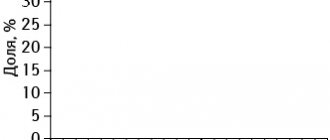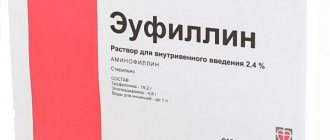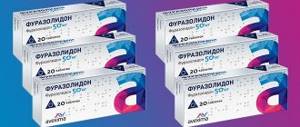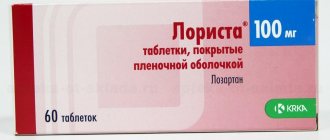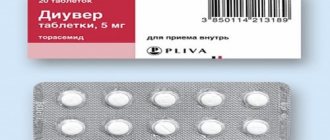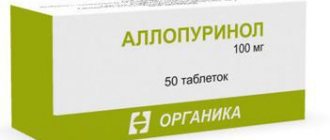Hypothiazide is a diuretic tablet that is often prescribed to patients with hypertension and is also sometimes taken for swelling. Below you will find instructions for using this medicine, written in clear language. Study its indications for use, contraindications and side effects. The article compares Hypothiazide and other popular diuretics - indapamide (Arifon), furosemide (Lasix). Read and figure out which diuretic medicine is best for you. Find out how to take Hypothiazide correctly: in the morning or in the evening, before or after meals, what is the optimal dosage and how many days is the course of treatment. The use of this medication to control high blood pressure is described in detail below.
Drug card
| Manufacturer | Chinoin Pharmaceutical (Hungary) |
| Pharmacological group | Diuretic (diuretic) agent |
| Active substance | Hydrochlorothiazide |
| Release form | Tablets 25 and 100 mg |
Contraindications
"Hypothiazide" diuretic has a number of contraindications. First of all, this is individual sensitivity to the constituent components of the drug. Also, the drug is not prescribed for problems with urine flow. Severe forms of renal and liver failure are a reason to discontinue the diuretic. In addition, if the level of potassium, sodium and magnesium in the body is high, the drug is contraindicated. The same applies to patients with Addison's disease.
How to take Hypothiazide correctly
Hypothiazide must be taken for a long time, every day, until the doctor decides that this medicine can be stopped or replaced with another drug. Take the tablets daily, one or more times a day, as directed by your doctor. Do not take breaks in treatment on your own initiative. As a rule, this medicine is not prescribed to be taken in the evening, so that the patient does not have to get up to go to the toilet one more time at night. But perhaps for some reason your doctor will decide that you should take Hypothiazide at night.
It rarely happens that Hypothiazide is prescribed for short courses of treatment. This medicine is intended for long-term use. As a rule, it should be taken for the rest of life, unless the patient experiences severe side effects. Keep in mind that diuretic medications do not affect the causes of hypertension and edema, but only temporarily reduce symptoms. If your blood pressure normalizes, swelling decreases or completely disappears, then this is not a reason to stop taking Hypothiazide tablets. Continue to take your prescribed medications every day, regardless of your blood pressure levels. If you want to reduce the dose or stop taking any medications, discuss with your doctor.
Directions for use and doses
The tablets should be taken after meals with a moderate amount of liquid. The following are the average dosages of the drug for adults:
- In case of high blood pressure, 25-50 mg of the active substance is prescribed per dose. The daily norm is no more than 100 mg. The duration of the course is 3 weeks.
- When used for edema, the dose is 25-100 mg of the substance. Use once a day or every 2 days.
- For diabetes insipidus, take 50-150 mg per day.
When prescribing the drug to children, the pediatrician calculates the dose based on 1-2 mg per kilogram of the child’s weight.
Instructions for use
| pharmachologic effect | Hypothiazide is a diuretic drug that belongs to the thiazide diuretics. It stimulates the kidneys to excrete more fluid and salt. Due to this, blood pressure decreases and swelling decreases. Unfortunately, along with excess sodium, the body also loses potassium and magnesium. But Hypothiazide reduces the excretion of calcium in the urine. This is a benefit for middle-aged and older women, who are at increased risk of osteoporosis. |
| Pharmacokinetics | The diuretic effect occurs 2-4 hours after taking Hypothiazide tablets. Each dose of this medicine taken lasts 6-12 hours. The active substance hydrochlorothiazide is excreted from the body mainly by the kidneys and not the liver. |
| Indications for use | High blood pressure (hypertension) - usually not alone, but together with other non-diuretic medications. Edema caused by various reasons: heart failure, acute glomerulonephritis, chronic renal failure, premenstrual syndrome in women, treatment with corticosteroids. Hypothiazide reduces the excretion of calcium in the urine. Thanks to this, it helps prevent the formation of certain types of stones in the genitourinary tract. |
| Contraindications | Allergy to hydrochlorothiazide or excipients that are included in the tablets. Allergy to sulfonamides. Kidney disease that stops urine production. Severe renal failure - creatinine clearance below 30 ml/min. Severe liver failure. Low levels of potassium or sodium in the blood. Excess calcium in the blood. Patients with liver cirrhosis, gout, diabetes mellitus and elderly people can take Hypothiazide, but they must be careful - regularly take blood tests, which will be prescribed by the doctor. |
| special instructions | Get regular blood tests for sodium, glucose, creatinine and other indicators that your doctor deems important. If your test results get worse, talk to your doctor about replacing Hypothiazide tablets, for example, with Indapamide. Eat green vegetables and drink herbal tea to provide your body with potassium. Once you start taking the medicine Hypothiazide, refrain from driving or driving dangerous machinery for 2-7 days. You can drive again when you are sure that you are tolerating the treatment well and there is no fatigue or weakness. |
| Dosage | Hypothiazide should be taken in the minimum dosage, which will be enough to lower blood pressure and reduce swelling. The doctor selects the initial dosage individually, and over time reduces or increases it based on the results of treatment. For hypertension, you can prescribe Hypothiazide 25-50 mg per day, but it is better to take 12.5 mg per day along with other medications that are not diuretics. Blood pressure begins to decrease after 3-4 days, and the maximum effect occurs after 3-4 weeks. For edema, hypothiazide is usually prescribed at 25-100 mg per day. |
| Side effects | When starting treatment with Hypothiazide tablets, you may experience headache, dizziness or stomach upset until your body gets used to it. Typical side effects are weakness, fatigue, constipation, and increased skin sensitivity to sunlight. There may be allergic reactions to the active substance of the drug Hypothiazide or its auxiliary components. This medicine negatively affects metabolism, especially at a dosage of 25 mg per day and above. The results of blood tests for sugar, uric acid, creatinine, and potassium may worsen. Due to dehydration and sodium deficiency in the blood, muscle cramps or heart rhythm disturbances are possible. These are rare but serious side effects that require prompt medical attention. |
| Pregnancy and breastfeeding | The active substance of the drug Hypothiazide penetrates the placental barrier and affects the fetus. The use of these tablets is contraindicated in the first trimester of pregnancy. In the second and third trimesters of pregnancy, they are occasionally prescribed only in severe cases, if the doctor decides that the benefit to the mother is higher than the risk to the fetus and/or child. Do not take Hypothiazide and other diuretics during pregnancy on your own initiative! If you are concerned about swelling, consult a doctor. Read also the article “High blood pressure in pregnant women.” Hydrochlorothiazide passes into breast milk. Therefore, treatment with Hypothiazide tablets is not compatible with breastfeeding. |
| Interaction with other drugs | Hypothiazide is often prescribed along with other blood pressure medications to increase their effectiveness. However, it may cause hypotension. Hypothiazide can negatively interact with cardiac glycosides, amiodarone, corticosteroids, insulin and diabetes pills, NSAIDs, and antidepressants. The above list of drug interactions is not complete. Read the official instructions for use for more details, and also discuss with your doctor. Tell your doctor about all the medications, dietary supplements and herbs that you are taking so that he takes into account their possible interaction with the drug Hypothiazide. |
| Overdose | An overdose of Hypothiazide tablets is deadly because it causes dehydration, as well as a deficiency of electrolytes - potassium, magnesium and others. Its symptoms: hypotension, cardiac arrhythmias, weakness, dizziness, fainting, nausea, vomiting, thirst, calf muscle cramps, decrease or complete stop of urine output. You need to urgently call an ambulance. Before her arrival, pour several liters of water into the patient’s stomach, then induce vomiting and give activated charcoal. You should drink plenty of fluids. You can dissolve in it electrolyte powders that are sold in pharmacies, or at least table salt. When doctors arrive, they will decide whether the patient needs to be hospitalized in the intensive care unit. |
| Release form | White or almost white round flat tablets. They have an “H” engraving on one side and a line on the other to make it easier to divide. |
| Storage conditions and periods | Store in a dark place out of reach of children at a temperature not exceeding 25 °C. Shelf life: 5 years. Do not use after the expiration date stated on the package. |
| Compound | The active ingredient is hydrochlorothiazide 25 or 100 mg. Excipients: magnesium stearate, talc, gelatin, corn starch, lactose monohydrate. |
Along with the drug Hypothiazide, they are also looking for:
- Veroshpiron
- Indapamide
- Furosemide
- Bisoprolol
Frequently asked questions and their answers
Below are answers to questions about the drug Hypothiazide that patients often have.
Hypothiazide or Indapamide: which is better?
In Russian-speaking countries, it is traditionally believed that Hypothiazide lowers blood pressure more strongly than Indapamide, although it causes more side effects. In March 2020, an article in English was published in the authoritative journal Hypertension, proving that Indapamide actually lowers blood pressure better than Hypothiazide. The authors of the article analyzed the results of 14 medical studies conducted in different years. All of these trials compared hypothiazide and indapamide. It turned out that Indapamide allows you to achieve blood pressure levels by 5 mm Hg. Art. lower than hypothiazide.
Thus, Indapamide is better than Hypothiazide, not only in terms of the frequency of side effects, but also in terms of effectiveness in the treatment of hypertension. Perhaps Hypothiazide is better than Indapamide in helping with edema. If you are concerned about the side effects of Hypothiazide tablets, or your blood test results for sugar, uric acid or creatinine are worsening, discuss with your doctor whether it is worth replacing your current diuretic medication with Indapamide. People who benefit from hydrochlorothiazide for hypertension or swelling and are not bothered by side effects have no reason to change from one drug to another.
Hypothiazide or furosemide: which is better?
It cannot be said that Hypothiazide is better than furosemide, or vice versa, because these are completely different drugs. Furosemide is much stronger than hypothiazide, but causes more serious side effects. Hypothiazide is often prescribed for patients with hypertension to take daily. A competent doctor will not prescribe furosemide for daily use for high blood pressure, because side effects will almost certainly occur.
Some patients take furosemide occasionally when they need to quickly lower their blood pressure during a hypertensive crisis. Even for such situations, there are safer and more effective medications than this diuretic. Read more in the article “Hypertensive crisis: emergency care“. It is not recommended to take furosemide every day unless hypertension is complicated by heart failure and edema. Using furosemide for self-medication causes severe side effects. You can find their descriptions in reviews left by affected people on Russian-language forums.
For patients with heart failure, furosemide is prescribed in cases where hypothiazide and other weak diuretics no longer help. You should try to get by with the weakest diuretic in the minimum dosage, which is enough to make the patient feel good. The first choice drug is hypothiazide rather than furosemide. Now the drug torasemide (Diuver) is replacing furosemide in the treatment of edema caused by heart failure and other causes. Furosemide remains a popular treatment for fluid accumulation in the abdominal cavity in cirrhosis of the liver.
Reviews
Most patients confirm the effective diuretic effect of Hypothiazide, including in the treatment of swelling in pregnant women. IN
As part of the treatment of heart disease and hypertension, taking the drug gives a more noticeable result when combined with other diuretics.
In one of the reviews, the author reports the formation of kidney stones, which was caused by taking the drug for several years. Patients cite general weakness and slowness of reactions as the most common adverse reactions from taking the drug, which results in problems with driving.
You can read even more reviews about the use of Hypatiazide at the end of the article.
special instructions
A course of long-term diuretic therapy requires regular monitoring of indicators characterizing the state of water-electrolyte balance. At risk are patients with the following pathologies:
- diseases of the cardiovascular system;
- disturbances in the functioning of the hepatic system;
- changes in water and electrolyte balance (muscle weakness, dry mouth, muscle pain , lethargy, thirst, oliguria, hypotension, tachycardia, convulsions, anxiety, drowsiness , disturbances in the digestive tract).
Hypokalemia can be avoided by taking special potassium-sparing medications and following a diet with foods rich in potassium (vegetables, fruits). Increased excretion of magnesium by the renal system is often recorded during treatment with thiazide diuretics. creatinine clearance . Predisposed patients may experience a cumulative effect and develop azotemia . In case of oliguria, the option of discontinuing hypothiazide is considered.
In case of pathology of the hepatic system, a thiazide diuretic is prescribed with caution, because even minor fluctuations in water and electrolyte balance can affect the level of ammonium in the blood and provoke hepatic coma. Hypothiazide can cause increased bilirubin in the blood. In severe coronary and cerebral sclerosis, a more attentive attitude to the patient's condition is required.
Taking thiazide medications affects glucose tolerance. In latent and manifest forms of diabetes mellitus, long-term diuretic therapy may require monitoring of metabolism , due to the need to adjust the dosage of hypoglycemic drugs. Patients suffering from impaired uric acid metabolism require special monitoring. Rarely, during long-term use of the diuretic Hypothiazide, changes in the functioning of the parathyroid glands are recorded, which is accompanied by hypophosphatemia and hypercalcemia . Thiazide forms of diuretics can reduce the level of the element iodine, which is able to bind to proteins in the serum, without affecting the functioning of the thyroid gland. Patients with glucose intolerance often report complaints about the functioning of the digestive tract. The medication affects the ability to drive a vehicle and perform various types of work that may require increased attention from the patient.
Use during pregnancy
During pregnancy in the first trimester, the drug "Hypothiazide" is contraindicated due to the presence of the active component hydrochlorothiazide in its composition. If the possible benefit to the mother is greater than the risk to the health of the fetus, the use of this drug is permitted in the 2nd and 3rd trimesters. This is confirmed by reviews and instructions for the Hypothiazide product.
The active substance contained in Hypothiazide is able to pass the placental barrier, which can lead to the development of thrombocytopenia, jaundice and other consequences in newborns. During lactation, the active component is excreted along with milk; interruption of breastfeeding is required if there is a need to take a diuretic.
Possible side effects
With increased dosages of Hypothiazide, side effects may occur.
The drug Hypothiazide causes side effects when the recommended dosage of tablets is exceeded, as well as in the case of a specific reaction of the body to the active components of the drug. Adverse reactions after using a diuretic drug include the following:
- disturbance of thought processes;
- muscle cramps;
- increased emotional excitability;
- feeling of dry mouth;
- thirst;
- emotional instability;
- allergic reactions of varying severity;
- violation of potency;
- anaphylactic shock;
- nausea, vomiting;
- increased fatigue and general weakness;
- stool disorders;
- headache;
- hives;
- visual impairment;
- dizziness;
- arrhythmia.
If severe side effects occur, you should stop using the drug and consult a doctor.
Features of use
Pregnant and lactating
The diuretic drug Hypothiazide cannot be used during pregnancy. This is especially true in the first trimester of pregnancy. In the middle and end of the term, tablets can be taken if the expected benefit to the mother outweighs the likely risk to the child . This is due to the property of “Hypothiazide” to reduce the volume of blood circulating in the body. As a result, there is a deficiency of oxygen supplied to the fetus, resulting in irreversible consequences for the child. If it is necessary to use the medicine during breastfeeding, it is recommended to transfer the child to artificial feeding. This is due to the ability of hydrochlorothiazide to pass into breast milk.
For children and elderly
Treatment with the drug in elderly people should be carried out under the supervision of doctors.
The diuretic drug “Hypothiazide” is used in pediatrics. However, it is recommended to prescribe it to children over 3 years of age. This is explained by the lack of data on the tolerability and safety of the medication for children. Also, for young children it is difficult to calculate the required dose and calculate the loss of beneficial microelements. Treatment of elderly patients using Hypothiazide is recommended in a hospital setting. In this case, the daily dose should be minimal. This is due to a strong diuretic effect. Uncontrolled use of the drug by older people provokes adverse reactions and complications.
For weight loss
If patients are overweight, there is a disturbance in the exit of excess fluid from the body. According to statistics, overweight people more often than others complain of hypertension and heart disease. For these reasons, doctors add diuretics to the list of medications. However, doctors do not recommend using Hypothiazide when losing weight. This is due to the pronounced effect that occurs within 1-2 hours after administration. To lose weight, it should be taken quite often and in large doses. This is fraught with an imbalance of substances and microelements. The result is complications and general health problems.
Children, pregnancy and breastfeeding
The use of the drug is contraindicated in the 1st trimester of pregnancy. In the 2nd and 3rd trimesters of pregnancy, the use of the drug is possible only if the expected benefit to the mother outweighs the potential risk to the fetus. Hydrochlorothiazide penetrates the placental barrier.
There is a risk of fetal or neonatal jaundice, thrombocytopenia and other consequences. The drug is excreted in breast milk. If it is necessary to use the drug during lactation, the issue of stopping breastfeeding should be decided.
Use in children
Contraindicated in children under 3 years of age (for solid dosage form - tablets).
Mechanism of action
Diuretics help lower blood pressure by removing excess fluid from the body.
“Hypothiazide” performs 2 functions: it removes excess fluid and promotes the release of harmful sodium and chlorine from the body. Hydrochlorothiazide reduces the process of reabsorption of sodium and chlorine ions in the renal tubules. The disadvantage of use is the removal of beneficial potassium ions, which leads to a deficiency of the microelement. The advantage of “Hypothiazide” is the lack of addiction to the active substance. As a result, the effect of using the medication does not decrease.
Drug interactions
Taking antihypertensive medications may require adjustment of the Hypothiazide dosage regimen, because drugs can potentiate each other's effects. Increased lithium toxicity and decreased renal clearance have been reported during treatment with lithium salts.
Hypomagnesemia and hypokalemia that occur during the use of diuretics can enhance the toxic effect of digitalis, which must be taken into account when taking Digoxin and other cardiac glycosides.
The risk of developing arrhythmia associated with hypokalemia increases significantly when taking Amiodarone. Hyperglycemia and a decrease in the effectiveness of oral forms of hypoglycemic medications are recorded when taking Hypothiazide. Potassium excretion increases when taking corticosteroid medications.
NSAIDs can reduce the effectiveness of diuretics and suppress the hypotensive effect of thiazides. It is possible to enhance the effectiveness of muscle relaxants (non-depolarizing forms). The hypotensive orthostatic effect is significantly enhanced by the use of barbiturates, ethanol, and opioid analgesics. Cholestyramine can reduce the absorption rate of Hypothiazide.
The risk of toxic effects from Amantadine increases because Hydrochlorothiazide reduces its clearance, increasing the concentration of Amantadine in the blood plasma. Temporary withdrawal of the thiazide diuretic is required before conducting tests characterizing the functional state of the parathyroid glands.
Hypothiazide price, where to buy
The cost of the medication is relatively low and varies within small ranges depending on the amount of the active substance, pharmacy chain, and region. The average price of Hypothiazide in Russia is 100 rubles.
- Online pharmacies in RussiaRussia
- Online pharmacies in UkraineUkraine
- Online pharmacies in KazakhstanKazakhstan
ZdravCity
- Hypothiazide tablets 100 mg 20 pcs. Chinoin
98 rub. order - Hypothiazide tablets 25 mg 20 pcs.Chinoin
79 RUR order
Pharmacy Dialogue
- Hypothiazide tablets 25 mg No. 20Chinoin
87 RUR order
- Hypothiazide tablets 100 mg No. 20Chinoin
112 rub. order
show more
Pharmacy24
- Hypothiazide 25 mg N20 tablets Quinoin Pharmaceutical and Chemical Products Plant Private Co. Ltd., Ugorshchina
48 UAH.order - Hypothiazide 100 mg No. 20 tablets Quinoin Pharmaceutical and Chemical Products Plant Private Co. Ltd., Ugorshchina
75 UAH order
PaniPharmacy
- Hypothiazide tablets Hypothiazide tablets. 100 mg No. 20 Hungary, Chinoin
93 UAH order
- Hypothiazide tablets Hypothiazide tablets. 25 mg No. 20 Hungary, Chinoin
53 UAH order
show more
Treatment of high blood pressure with diuretics
During treatment, patients are required to undergo regular tests to monitor levels of important substances in the blood. It is also necessary to monitor changes in blood pressure and the functioning of the urinary system. If various complications occur, you need to stop taking the pills and consult a doctor.
If Hypothiazide is prescribed as part of complex therapy with other hypertensive drugs, then the correct dosage must be selected. Although the drugs are compatible, their simultaneous use can cause a sharp decrease in blood pressure and collapse. Hypothiazide is not recommended to be combined with anti-inflammatory drugs, since the diuretic effect may be significantly lower than necessary. When using the drug in patients with diabetes mellitus, regular monitoring of blood glucose levels is required.
In case of possible overdose
In case of an overdose, the following symptoms may appear: due to the rapid loss of fluid and electrolytes, tachycardia, decreased blood pressure, shock, weakness, confusion, dizziness, pain in the calf muscles, fatigue, nausea, vomiting, severe thirst, polyuria, may occur. oliguria or anuria.
In case of overdose, it is necessary to induce vomiting, rinse the stomach, and then take activated charcoal. Monitoring of water and electrolyte balance (especially serum potassium levels) and kidney function is required until normal values are established. There is no special antidote.
What Hypothiazide tablets help with is of interest to many.
General characteristics of the drug
Hypothiazide tablets are a synthetic diuretic. The drug accelerates the process of removing chlorine and sodium from the body. It is produced in different dosages - 25 or 100 mg.
The main active ingredient of the drug is hydrochlorothiazide. It is not fully, but quickly absorbed from the gastrointestinal tract, and the effect lasts from 6 to 12 hours.
One tablet of Hypothiazide 25 mg contains 25 mg of hydrochlorothiazide, and one tablet of Hypothiazide 100 contains 100 mg, respectively.
The excipients of these tablets are lactose, magnesium stearate, corn starch, gelatin.
Hypothiazide, in addition to its diuretic effect, has a hypotensive effect. This medicine has no effect on normal blood pressure.
Note! With long-term use, the diuretic properties of Hypothiazide do not decrease.
Indications for use
The drug Hypothiazide is prescribed for the following diseases and conditions:
- hypertension;
- chronic heart failure;
- swelling;
- state of premenstrual tension;
- chronic kidney disease;
- nephrotic syndrome;
- glomerulonephritis.
Hypothiazide is also prescribed when taking corticosteroids, as well as to control polyuria in nephrogenic diabetes.
Hypothiazide is used to eliminate edema in congestive heart failure, liver cirrhosis with ascites, and premenstrual syndrome.
Sometimes these tablets are recommended to prevent stone formation in the urinary tract in patients who are predisposed to this condition.
Composition and release form
The drug "Hypothiazide" is a diuretic. Its pharmacological group is “Diuretics”. Externally, these are white or grayish tablets. They are round and slightly flattened in shape. There is a line on one side of the pill and an “N” on the other. The active substance is hydrochlorothiazide. The drug has 2 dosages - 100 and 25 mg. "Hypothiazide" is produced in a cardboard package with 20 tablets. The components also include:
Enter your pressure
Move the sliders
120
on
80
| Substance in tablet | Functions performed |
| Magnesium stearate | Acts as a thickener and helps keep the tablet in shape. Also acts as a binder. |
| Talc | Used as a filler and thickener. Gives the tablet a glossy shine. |
| Gelatin | Provides easy dissolution of components in water. |
| Corn starch | Provides the necessary volume for tablets and binds the components together. |
| Lactose monohydrate | Pill filler, used as a sugar substitute. |
Analogs
In the pharmacy chain you can find for sale a number of structural analogues (synonyms) of Hypothiazide containing the same active substance:
- Hydrochlorothiazide (table);
- Hydrochlorothiazide-Verte; (caps.);
- Dichlorothiazide (table);
- Apo-triazide (table);
- Hydrochlorothiazide (table);
- Hydrochlorothiazide-SAR (table);
- There is also an analogue of Hypothiazide, which has a similar effect, but has a different chemical composition - Cyclomethiazide (Table)
Based on materials from the site: https://www.tiensmed.ru/news/gipotiazid-ab1.html
Compatibility with other drugs
If you are taking other medications in parallel with Hypothiazide, you need to become familiar with how the first one interacts with other tablets or solutions.
It is prohibited to combine Hypothiazide with:
- barbiturates;
- antidepressants;
- alcohol.
When taking Hypothiazide simultaneously with muscle relaxants (non-depolarizing), the effect of the latter may be enhanced.
When taking medications to treat gout, their dosage will need to be adjusted, since the main active ingredient of the drug, Hypothiazide, can increase the level of uric acid in the serum.
